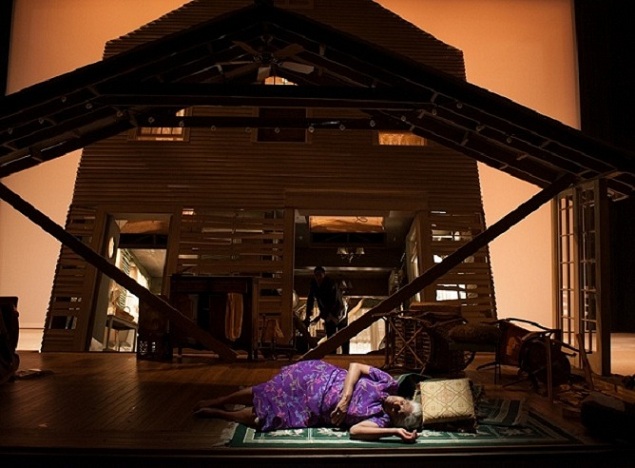Steppenwolf's Head Of Passes Takes A Hard Look At Faith
By Melody Udell in Arts & Entertainment on Apr 23, 2013 6:10PM

Shelah, played by Cheryl Lynn Bruce, sleeps next to her demolished home in Steppenwolf's Head of Passes. Photo credit: Michael Brosilow.
Between her leaking roof, a household full of bickering friends and family and her own failing health, it’s a good thing Shelah has her faith. That’s what she clings to, in both good times and bad. And for Shelah, the bad times seem to outweigh the good. So what does it mean when the innately good, the relentlessly faithful, suffer indignity after indignity? That’s the question upcoming young playwright Tarell Alvin McCraney and director Tina Landau attempt to answer in this powerful, thought-provoking play, Head of Passes.
Drawing inspiration from the biblical Book of Job, McCraney’s play is set at the mouth of the Mississippi River Delta, a swampy marshland known as Head of Passes. After her husband dies, Shelah, played by an unwavering Cheryl Lynn Bruce, is left to take care of their crumbling bed and breakfast and three children, now adults with their own sets of problems. Their adopted daughter, Cookie (Alana Arenas), is a mother of two herself, although her drug habits and inability to keep a job deems her pretty unfit for the role. Shelah’s sons, the lazy Spencer (James T. Alfred) and favorite child Aubrey (Glenn Davis), are too busy attempting to move their mother into a safer home to notice that her health is failing. But despite their issues, the three have somehow come together — along with some family friends and the town doctor — to celebrate a reluctant Shelah’s birthday.
With the whole family under the same leaking roof, long-hidden secrets come to light, and Shelah is forced once again to use her faith as a barrier between her and the “house of sin” she occupies. But just as the inner turmoil comes to a head, the raging storm outside rips the house apart, beam by beam. Scenic designer David Gallo’s fantastic deconstructing set is a true marvel.
McCraney’s second act, while not nearly as strong as the first, begins with Shelah hosting an imaginary church service by herself alongside the ruins of her home. Bruce is at her finest here, and while McCraney has written a monologue that is both funny and heart-breaking, it is not a lesson in brevity. When a construction worker (Chris Boykin) comes to demolish what’s left of the house, Shelah mistakes him for a silent angel that appeared to her in the first act — a scene that suggests, not for the first time, that Shelah's state of mind is more fragile than we think.
From the first moments of the play, we learn that Shelah is ready for deliverance, not only from her problematic life but from the guilt that goes along with it. Despite the ever-shifting marshlands beneath her feet, Shelah has rooted herself in her faith — McCraney has built a powerful show around this steadfast woman who has come to terms with suffering. Whether or not Shelah truly deserves it is a question she’ll keep asking herself until the answer is no longer relevant.
The Steppenwolf Theatre is at 1650 N Halsted. Box office: 312-335-1650. Tickets on sale now.